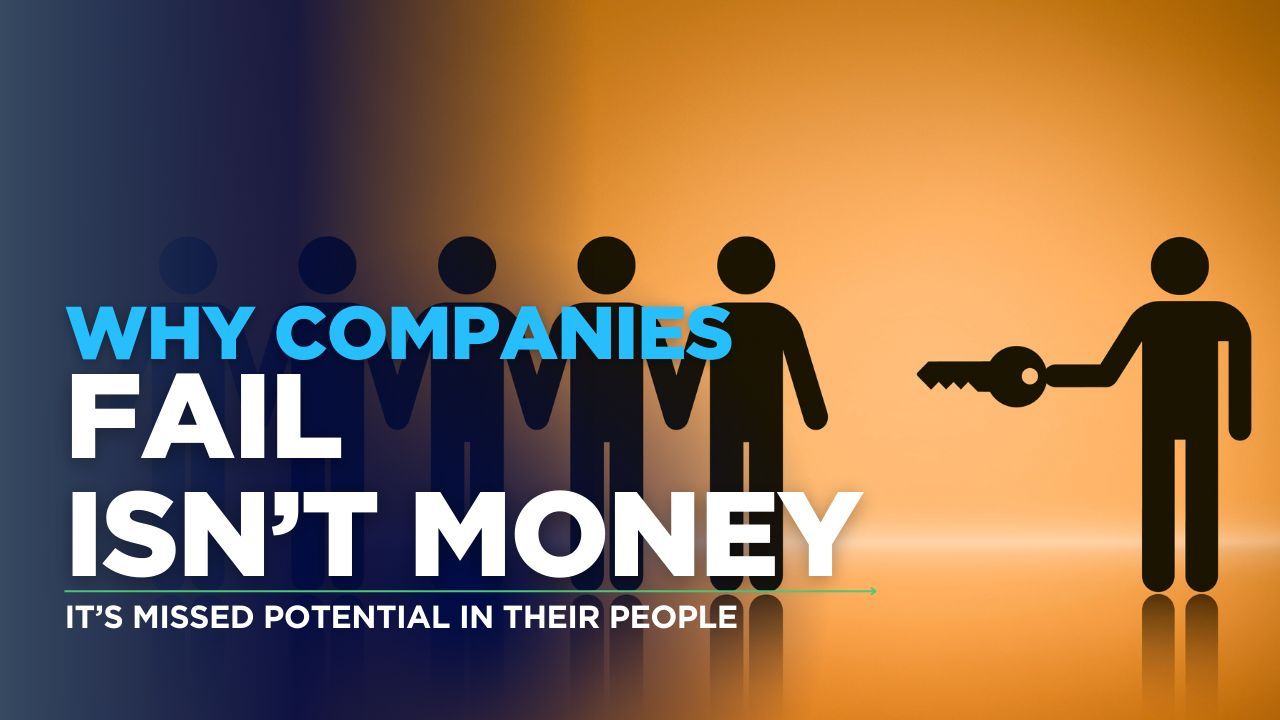Why Companies Fail Isn’t Money
Sep 29, 2025
It’s Missed Potential in Their People
Gallup has tracked employee engagement since the early 1990s. The findings are astonishingly consistent: only about one-third of employees in the U.S. are engaged in their work. That means the majority show up physically, but not fully emotionally or mentally. The cost is immense - Gallup estimates disengagement drains the global economy by $8.8 trillion annually.
What’s most troubling is that, despite decades of leadership books, training programs, and corporate initiatives, the numbers haven’t significantly improved.
So what’s going on?
The Overlooked Factor: Growth Opportunities
When I spoke with professionals during the early days of COVID—when everyone was isolated but more open than ever—I heard the same themes again and again:
- “I don’t feel appreciated.”
- “I don’t see a future here.”
- “I feel trapped in a rat race.”
One theme rose above the rest: the lack of opportunity to grow.
I saw this firsthand inside a company that eventually collapsed. A talented team leader had been passed over for a management role. She asked leadership to sponsor a certification that would have made her promotion possible. The cost was modest—a few thousand dollars. Instead, the company chose to spend multiples of that on relocating an external hire from across the country.
Not only did they waste money, but they also lost trust. The overlooked employee - and many others - walked out. The company didn’t shut down because of a financial crisis. It shut down because its people no longer believed in its future.
This isn’t an isolated story. Research consistently shows that employees who see a path for growth are 2.9 times more likely to be engaged. LinkedIn’s Workplace Learning Report echoes this: 94% of employees say they would stay at a company longer if it invested in their career development.
PepsiCo’s Upskilling for Career Mobility
PepsiCo, one of the world’s largest food and beverage companies, recognized the challenge head-on. With more than 100,000 U.S.-based employees, many in front-line roles, they knew retaining and growing talent was critical to long-term success.
They built a suite of upskilling initiatives that cover everything from high school diplomas and digital literacy to degree programs—at no cost to employees. As Molly Nagler, PepsiCo’s Chief Learning Officer, explained: “Everyone has a different ‘why’ that motivates them to learn.”
The results have been powerful:
- Employees completing programs aren’t just learning—they’re moving into new roles.
- Front-line workers see real pathways to advancement.
- PepsiCo fills skill gaps internally instead of constantly looking outside.
By aligning company needs with individual aspirations, PepsiCo strengthens both loyalty and profitability. In a competitive labor market, that alignment is more valuable than any bonus package.
Building a Self-Managing System
When you align your company’s ambitions with your team’s personal growth, you create something remarkable: a self-managing system.
- Instead of trying to motivate, you enable.
- Instead of constantly recruiting replacements, you retain and elevate.
- Instead of burning cash on misaligned hires, you multiply returns on the people you already have.
This is how businesses scale sustainably. This is how they outlast their founders. And this is how they create legacies that benefit future generations.
Because at the end of the day, it isn’t your balance sheet that carries your vision forward. It’s your people.
Conclusion
The companies that thrive across decades share a common thread: they invest in people, not just in profits. Training budgets, mentorship programs, and career pathways are not line items to be trimmed; they are compounding investments in the very system that carries a founder’s vision forward.
The question worth asking isn’t whether your team has the right skills today. It’s whether your business would continue to grow tomorrow if you stepped back. Would your people know how to adapt, lead, and expand the vision without you?
Legacy isn’t secured by quarterly results. It’s secured when the people inside the organization feel that the company’s success is inseparable from their own. When that alignment exists, the business doesn’t just survive market shifts—it becomes the kind of enterprise that outlives its founder.

